|
|
|
Sort Order |
|
|
|
Items / Page
|
|
|
|
|
|
|
| Srl | Item |
| 1 |
ID:
188826
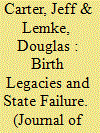

|
|
|
|
|
| Summary/Abstract |
We argue patterns of state failure are influenced by variation in how states emerged as independent political actors. In particular, states with positive birth legacies, those whose emergence required relatively high levels of capacity and legitimacy, should be less likely to experience state failure than countries that experienced less auspicious births. We assess this claim on the universe of states in the international system between 1950 and 2002 with multistate duration models that estimate the probabilities states transition into and out of periods of failure. We find that states with positive birth legacies are less likely to experience state failure and that this relationship is driven by states with positive birth legacies being able to more quickly transition from failure back to being functioning states. Our findings offer evidence that state failure is usefully thought of in the context of state-making processes and show that how states emerge as independent actors influences phenomena central to comparative and international politics.
|
|
|
|
|
|
|
|
|
|
|
|
|
|
|
|
| 2 |
ID:
188828
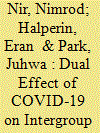

|
|
|
|
|
| Summary/Abstract |
The coronavirus pandemic has fundamentally shifted the way human beings interact, both as individuals and groups, in the face of such a widespread outbreak. This paper seeks to investigate the effects of COVID-19 on intergroup emotions and attitudes within an intractable intergroup conflict, specifically, through the lens of the Korean conflict. Using a two-wave, cross-sectional design, this study was able to track the profound psychological changes in intergroup emotions and attitudes both prior to the pandemic and during its onslaught. Results of these two wave representative samples show that South Korean citizens demonstrated higher levels of fear of their neighbors in North Korea after the outbreak of COVID-19 than before. In turn, this led to increased societal support of hostile government policies towards North Koreans. Conversely, the same participants exhibited higher levels of empathy towards North Koreans during the pandemic, which led to a higher willingness to collaborate with their outgroup. This dual effect on intergroup emotions within intractable conflicts brings forth new avenues from which societies may be able to restrain the destructive influence of the COVID-19 threat on intergroup relations — as well as harvesting its constructive potential for reconciling warring intergroup relations.
|
|
|
|
|
|
|
|
|
|
|
|
|
|
|
|
| 3 |
ID:
188824
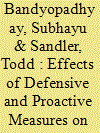

|
|
|
|
|
| Summary/Abstract |
A two-stage game investigates how counterterrorism measures affect within-country competition between two rival terrorist groups. Although such competition is commonplace (e.g., al-Nusra Front and Free Syria Army; Revolutionary Armed Forces of Colombia and the National Liberation Army; and al-Fatah and Hamas), there is no theoretical treatment of how proactive and defensive measures influence this interaction. Previous studies on rival terrorist groups are solely empirical concerning group survival, outbidding, and terrorism level, while ignoring the role that government countermeasures exert on the rival groups’ terrorism. In a theoretical framework, alternative counterterrorism actions have diverse impacts on the level of terrorism depending on relative group sizes and government-targeting decisions. In the two-stage game, optimal counterterrorism policy rules are displayed in terms of how governments target symmetric and asymmetric terrorist groups. Comparative statics show how parameter changes affect Nash or subgame perfect equilibrium outcomes.
|
|
|
|
|
|
|
|
|
|
|
|
|
|
|
|
| 4 |
ID:
188827
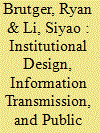

|
|
|
|
|
| Summary/Abstract |
Domestic debates about trade have increased the salience of international economic cooperation among the public, raising the question of whether, and how, domestic support can be rallied in support of international trade agreements. We argue that institutional features of trade agreements provide important cues to domestic audiences that shape support, particularly the membership composition and voting rules for multilateral deals. We use two survey experiments to show that the US public is more supportive of trade when it is negotiated with like-minded countries. We also find that the voting rules shape support for trade agreements, but differently across partisan audiences. Republican voters strongly favor the home country having veto power, whereas Democrats prefer agreements with equal voting rules. These differences are largely driven by perceptions of the agreement’s benefit for the nation and the public’s trust of the negotiators and perceived fairness of the rules.
|
|
|
|
|
|
|
|
|
|
|
|
|
|
|
|
| 5 |
ID:
188825
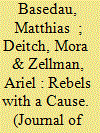

|
|
|
|
|
| Summary/Abstract |
Ideology may directly provide motive and indirectly capacity for collective violence, thus making armed conflicts longer and bloodier. We investigate these propositions by drawing on an innovative global dataset which codes ideological claims by rebel groups and governments in intrastate armed conflicts since 1946. Results demonstrate that although ideology increases conflict duration, these effects vary by type and timing. Whereas secular ideological conflicts tended to be more protracted during the Cold War, religious ideology has become increasingly important since. We, however, find little evidence that ideology increases conflict intensity. Rather, rebel criminality best accounts for intensity. So, while immaterial resources like ideology sustain willingness to fight, ideology’s influence upon conflict intensity is limited, especially after the Cold War. Future studies need to take ideology seriously and need to investigate its characteristics more in-depth and in conjunction with material, identity related and international variables.
|
|
|
|
|
|
|
|
|
|
|
|
|
|
|
|
| 6 |
ID:
188823
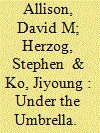

|
|
|
|
|
| Summary/Abstract |
How robust is public support for extended nuclear deterrence in patron and client states? Recent studies have improved scholarly understanding of US public opinion about nuclear weapon use against non-nuclear adversaries. Yet, there is limited knowledge of public attitudes regarding retaliation for nuclear strikes against US allies. We develop a theoretical typology of nuclear crises and investigate this phenomenon with a novel survey experiment (n = 6,623). Americans, Japanese, and South Koreans viewed realistic emergency alert messages about a most-likely case for nuclear retaliation: a North Korean missile attack on a US ally protected by the nuclear umbrella. Support for nuclear retaliation is low in all three countries, with important cross-national differences. Favorability increases with North Korean nuclear first-use, but it remains limited nonetheless. Surprisingly, US “tripwire” troop casualties do not increase Americans’ demands for nuclear retaliation. These findings have important implications for the study of nuclear crises and practice of extended deterrence.
|
|
|
|
|
|
|
|
|
|
|
|
|
|
|
|
| 7 |
ID:
188822


|
|
|
|
|
| Summary/Abstract |
How do drones affect escalation dynamics? The emerging consensus from scholarship on drones highlights increased conflict initiation when drones allow decisionmakers to avoid the risks of deploying inhabited platforms, but far less attention has been paid to understanding how drones affect conflict escalation. Limited theorization and empirical testing have left debates unresolved. I unpack the underlying mechanisms influencing escalation decisions involving drones by proposing a logic of remote-controlled restraint: drones limit escalation in ways not possible when inhabited assets are used. To test this logic and explore its instrumental and emotional microfoundations, I field "comparative wargames." I immerse national security professionals in crisis scenarios that vary whether a drone or inhabited aircraft is shot down. I validate wargame findings using a survey experiment. The wargames shed light on the microfoundations of escalation, highlight limits of existing theories, and demonstrate the utility of comparative wargaming as an IR research tool.
|
|
|
|
|
|
|
|
|
|
|
|
|
|
|
|
|
|
|
|
|